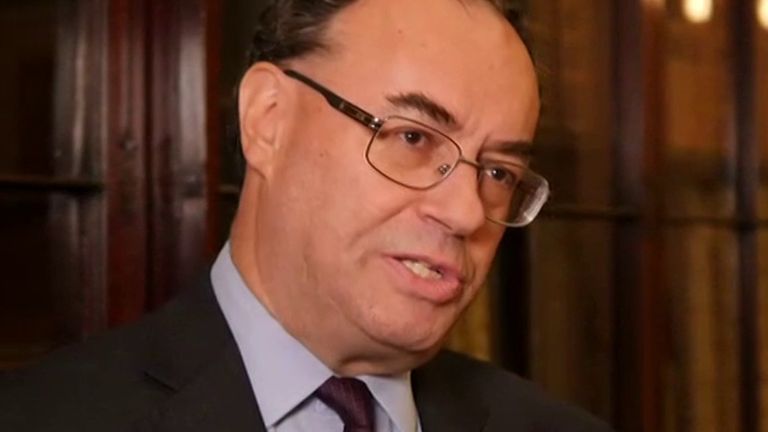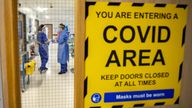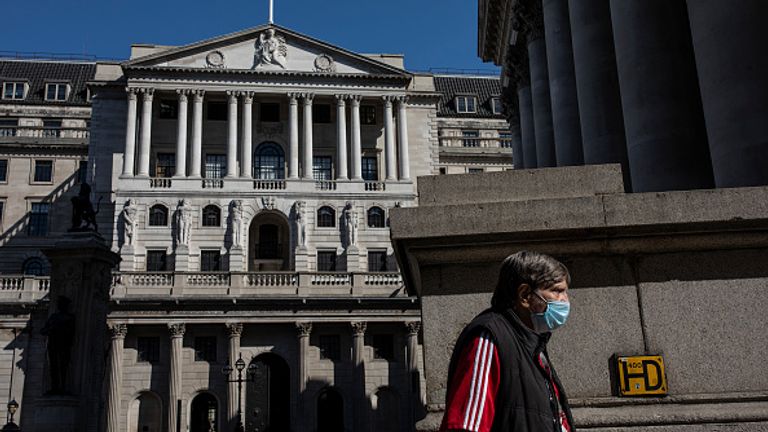Coronavirus: Bank of England rescued government, reveals governor
Andrew Bailey has told Sky News that if the Bank had not intervened the government would have struggled to fund itself.
Monday 22 June 2020 23:52, UK
The government would have struggled to fund itself if the Bank of England had not intervened during the market "meltdown" of COVID-19, the Bank's governor has told Sky News.
In an exclusive interview, Andrew Bailey said that in the early stages of the virus, Britain came within a whisker of not being able to sell its debt - something many would characterise as effective insolvency.
Talking to the new Sky News podcast, The World Tomorrow, the governor also warned that many viable British companies will not survive the COVID-19 recession, his clearest signal yet that the economy will be left permanently scarred by the crisis.
Mr Bailey, who started as governor as the crisis began, talked extensively about the early days of the economic crisis, when markets were in freefall and for a period it looked as if the government would not be able to sell its debt to private investors, something unheard of.
While there was an uncovered gilt auction in 2009 - in other words, the government was unable to find buyers for all of the debt it was selling to investors - it was widely seen as a one-off.
Mr Bailey warned that the dislocation in markets in March was even more serious, prompting the Bank to intervene with £200bn of quantitative easing - the biggest single cash injection in its history.
The governor said: "We basically had a pretty near meltdown of some of the core financial markets.
"We had a lot of volatility in core markets: the core exchange rate, core government bond markets.
"We were seeing things that were pretty unprecedented, certainly in recent times. And we were facing serious disorder."
Asked what would have happened had the Bank not intervened, Mr Bailey said: "I think the prospects would have been very bad. It would have been very serious.
"I think we would have a situation where in the worst element, the government would have struggled to fund itself in the short run."
That, he added, had never happened in living memory.
The Bank's decision to create so much money and use it to buy government bonds, including an extra £100bn only last week, has prompted some to ask whether it is in effect financing the government's borrowing. Mr Bailey rejected the accusations of "monetary financing".
"At no point have we thought that our job was just to finance whatever debts the government issue," he said, pointing out that the objective was to ensure economic stability.
In the podcast, the governor also said that the UK needs to brace itself for the end of the jobs miracle that has seen unemployment drop below 4%, and that the structure of the economy would be changed by the crisis.
He said many indebted companies will struggle to finance themselves in the coming months, but that the problems went beyond those with balance sheet problems: "There will be some activities which people did before COVID which they will just not go back to. It's not going to be the same for some period of time.
"So I think there'll be some activities and companies who say they had a perfectly viable business model before and weren't over-indebted, but sadly, habits have changed.
"There will be companies who won't survive - that's unfortunately the case."
The governor said that he expected some "structural change which will cause jobs to be lost".
The remarks are significant because the Bank's existing scenario for the virus aftermath assumes that after a sharp rise in unemployment during the lockdown, the jobs market gradually returns to normal.
Mr Bailey's comments imply he is no longer as confident about that full recovery.
He said that the UK was facing twin challenges from COVID-19 and Brexit.
"With COVID we could find that there are activities that worked in the economy prior to COVID, which turn out to be just not viable, or people don't want to do them in the in the world to come," he said.
"And that could change the parts of the structure of the economy - it could change the way we travel.
"I think Brexit could lead to some changes in the trade patterns of the country over time. And again, some point to structural adjustment could happen."
He added that one paradoxical consequence of this is that productivity, which has been low in recent years, could actually rise meaningfully for the first time in a decade.
"One of the puzzles of the post-financial crisis period has been very weak productivity growth and very strong employment.
"We've been mis-forecasting the labour market for some time because the traditional models just didn't seem to hold.
"I do wonder whether a shock of this size - and the fact that there are so many people who are furloughed whose jobs are now suspended - will cause some change in the labour market where some companies will have to cut costs and we'll get some shake-out, which might ironically cause productivity to increase, at the expense of higher unemployment."
The governor signalled that the government may need to consider finding a vehicle to resolve the many bad debts left by companies that fail over the COVID-19 period.
"If (a bad bank) were to be contemplated, it would be as a sort of an an asset management vehicle: how do we manage small firms through a problem that they would get as a result of the loans that they've taken on to deal with the crisis?"
Andrew Bailey was talking to former chancellor Sajid Javid and our economics editor Ed Conway for Sky News' new podcast, The World Tomorrow.






